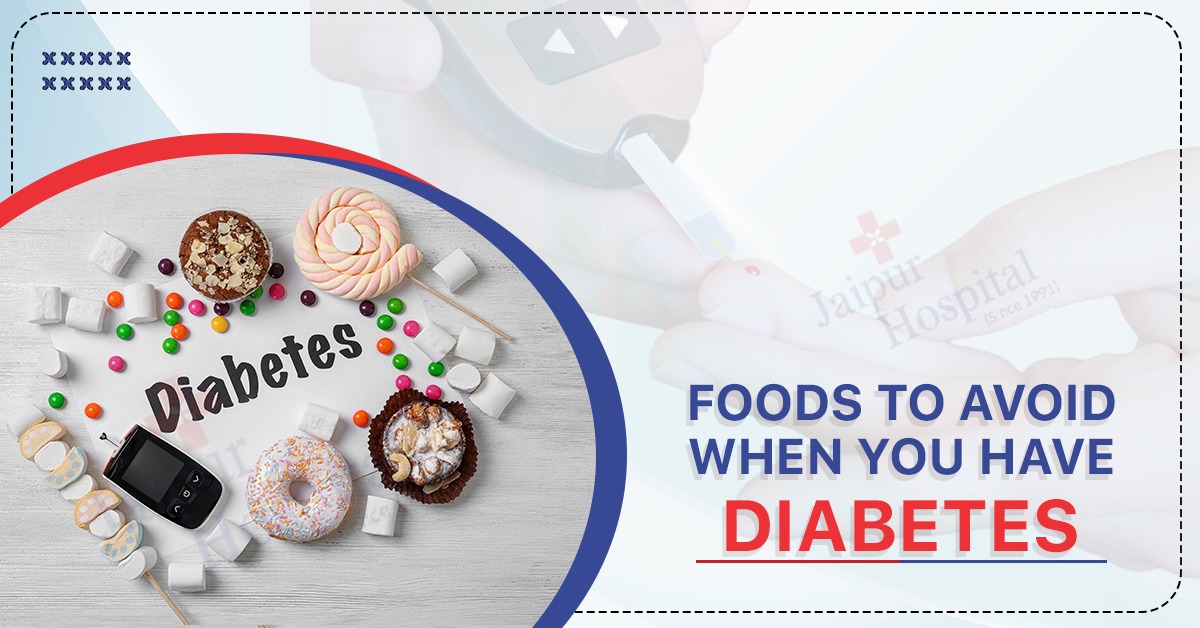Diabetes is a chronic condition characterized by high blood sugar levels, and managing diabetes requires making thoughtful and informed food choices. The relationship between diabetes and food is crucial, as the types and amounts of food consumed directly impact blood sugar control and overall health.
When it comes to food choices for diabetes management, carbohydrates play a significant role. Monitoring carbohydrate intake is essential to prevent blood sugar spikes. Choosing complex carbohydrates with a lower glycemic index, such as whole grains, non-starchy vegetables, and legumes, can help regulate blood sugar levels more effectively.
By making informed food choices and working closely with healthcare professionals or registered dietitians, individuals with diabetes can effectively manage their condition, promote stable blood sugar levels, and enhance their overall well-being.
12 Food to Avoid in Diabetes:
When managing diabetes, there are certain foods that are generally advised to be avoided or consumed in moderation due to their potential impact on blood sugar levels. However, it’s important to note that individual dietary needs may vary, and it’s recommended for diabetic patients work with healthcare professionals or registered dietitians to create a personalized meal plan. Here are some common foods to be cautious about and their healthier alternatives:
- Sugary Beverages: Avoid regular sodas, fruit juices, energy drinks, and sweetened teas. Instead, opt for water, unsweetened herbal teas, infused water, or sugar-free beverages.
- Refined Grains: Limit foods made from refined grains like white bread, white rice, and sugary cereals. Choose whole grain alternatives such as whole wheat bread, brown rice, quinoa, and oatmeal.
- Sugary Snacks and Desserts: Minimize intake of cookies, cakes, pastries, and candies. Opt for fresh fruits, unsweetened yogurt, or homemade snacks made with natural sweeteners like stevia or small amounts of honey.
- Processed Meats: Reduce consumption of processed meats like sausages, hot dogs, and deli meats. Choose lean protein sources such as skinless poultry, fish, tofu, or legumes.
- High-Fat Foods: Limit foods high in unhealthy fats like fried foods, fatty cuts of meat, full-fat dairy products, and creamy sauces. Opt for healthier fats from sources like avocados, nuts, seeds, and olive oil in moderation.
- Sweetened Condiments: Avoid condiments like ketchup, barbecue sauce, and sweet salad dressings that often contain added sugars. Look for sugar-free or low-sugar options, or use alternative seasonings like herbs, spices, and vinegar.
- Trans Fats: Stay away from foods high in trans fats, such as commercially baked goods, fried foods, and processed snacks. Choose foods with healthier fats like monounsaturated and polyunsaturated fats.
- Sugary Breakfast Cereals: Avoid cereals with high sugar content. Opt for the whole grain, low-sugar cereals or oatmeal with added nuts, seeds, or berries for added nutrition.
- Sweetened Yogurts: Limit yogurts with added sugars. Choose plain, unsweetened yogurt and add fresh fruits or a small amount of natural sweeteners like stevia or honey for flavor.
- Canned Fruits in Syrup: Opt for fresh or frozen fruits instead of canned fruits in syrup, which contain added sugars. If using canned fruits, choose those packed in water or natural juice.
- Alcohol: Limit alcohol consumption as it can affect blood sugar levels. If you choose to drink, do so in moderation and consult with a healthcare professional for guidance.
- High-Sodium Foods: Minimize intake of foods high in sodium, such as processed snacks, canned soups, and fast food. Choose fresh, whole foods and use herbs, spices, and natural flavorings to enhance taste.
Best Food for Diabetic Control:
When it comes to the best food for diabetic patients, it’s important to focus on a well-balanced diet that includes a variety of nutrient-dense foods. Here are some examples of foods that are generally considered beneficial for diabetic patients:
- Non-Starchy Vegetables: These include leafy greens, broccoli, cauliflower, peppers, cucumbers, and zucchini. They are low in carbohydrates and calories while being rich in fiber, vitamins, and minerals.
- Whole Grains: Whole grains like quinoa, brown rice, oats, and whole wheat bread provide more fiber and nutrients compared to refined grains. They have a lower glycemic index, which means they cause a slower and more gradual rise in blood sugar levels.
- Lean Proteins: Good sources of lean protein include skinless poultry, fish, tofu, legumes, and low-fat dairy products. Protein can help with satiety and blood sugar control.
- Healthy Fats: Avocados, nuts, seeds, and olive oil are examples of healthy fats. These provide essential fatty acids and can help improve heart health.
- Berries: Berries like strawberries, blueberries, and raspberries are rich in antioxidants, fiber, and vitamins. They have a lower glycemic index compared to other fruits and can be a good option for diabetic patients.
- Greek Yogurt: Greek yogurt is high in protein and lower in carbohydrates compared to regular yogurt. It can be a nutritious option for diabetic patients, but it’s important to choose plain, unsweetened varieties.
- Legumes: Lentils, chickpeas, and beans are excellent sources of fiber, protein, and complex carbohydrates. They have a low glycemic index and can help regulate blood sugar levels.
- Healthy Beverages: Water is the best choice for hydration. Unsweetened herbal teas, infused water, and sugar-free beverages can be good alternatives to sugary drinks.
Importance of food choices in Diabetes:
Food choices are of paramount importance in managing diabetes effectively. Making appropriate food choices can help individuals with diabetes maintain stable blood sugar levels, manage their weight, and reduce the risk of complications associated with the condition. Here are some key reasons highlighting the importance of food choices in diabetes management:
- Blood sugar control: The primary goal of managing diabetes is to regulate blood sugar levels. Food choices directly impact blood sugar levels, particularly carbohydrates. Selecting carbohydrates with a lower glycemic index and controlling portion sizes can help prevent spikes and dips in blood sugar, promoting better glucose control.
- Weight management: Maintaining a healthy weight is crucial for managing diabetes. Making wise food choices can contribute to weight management by incorporating nutrient-dense foods, controlling calorie intake, and promoting satiety. Including a balanced mix of protein, healthy fats, and high-fiber foods can help individuals feel fuller for longer and avoid overeating.
- Nutritional balance: Diabetes should not compromise overall nutritional needs. Opting for a well-balanced diet ensures that individuals receive essential vitamins, minerals, and other nutrients necessary for overall health. Including a variety of fruits, vegetables, whole grains, lean proteins, and healthy fats can help meet nutritional requirements while managing blood sugar levels.
- Heart health: Individuals with diabetes have a higher risk of developing heart disease. Making heart-healthy food choices can reduce this risk. Selecting foods low in saturated and trans fats, sodium, and added sugars, while emphasizing sources of healthy fats, such as avocados, nuts, and olive oil, can support heart health.
- Energy levels and well-being: Food choices impact energy levels and overall well-being. Selecting nutritious foods that provide sustained energy and avoiding blood sugar fluctuations can help individuals feel more energized and maintain better focus throughout the day.
- Diabetes complications: Consistently making healthy food choices can help reduce the risk of complications associated with diabetes, such as cardiovascular disease, nerve damage, kidney disease, and eye problems. A balanced diet rich in whole foods can help manage blood pressure, cholesterol levels, and overall organ health.
- Lifestyle management: Diabetes management involves adopting a healthy lifestyle. Food choices are a central aspect of this. Making mindful and informed food choices promotes a positive relationship with food, fosters healthy eating habits, and supports long-term adherence to a diabetes management plan.
Also read: Personal Hygiene Tips for Hair, Skin and Body Parts
Summary:
In conclusion, managing diabetes through careful food choices is essential for maintaining stable blood sugar levels and overall health. The impact of carbohydrates, particularly complex carbohydrates with a low glycemic index, cannot be underestimated. Incorporating fiber-rich foods, lean proteins, and healthy fats is crucial for blood sugar control, weight management, and overall nutrition.
Avoiding sugary foods, refined grains, unhealthy fats, and excessive sodium is important in diabetes management to prevent blood sugar imbalances and related complications. Portion control, meal timing, and consistency are also key factors to consider.
Collaboration with healthcare professionals or registered dietitians are highly recommended to create personalized meal plans that suit individual needs and preferences. They can provide expert guidance, monitoring, and support throughout the diabetes management journey.
By making informed food choices and adopting a healthy lifestyle, individuals with diabetes can successfully manage their condition, minimize complications, and improve their quality of life. Diabetes should not be seen as a limitation, but rather an opportunity to embrace a balanced and nutritious approach to food that promotes overall well-being.


